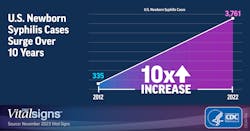New Centers for Disease Control and Prevention (CDC) data reveal that more than 3,700 babies were born with syphilis in 2022, which was more than 10 times the number in 2012. The increase in newborn syphilis follows rising syphilis cases among women of reproductive age combined with social and economic factors that create barriers to high-quality prenatal care and ongoing declines in the prevention infrastructure and resources.
Key findings:
- Almost 9 in 10 cases of newborn syphilis in 2022 might have been prevented with timely testing and treatment during pregnancy.
- More than half were among people who tested positive for syphilis during pregnancy but did not receive adequate or timely treatment.
- Nearly 40 percent were among mothers who were not in prenatal care.
One of the biggest risk factors for syphilis for some people is where they live. According to previous CDC data, in 2021, more than 70 percent of the U.S. population lived in counties considered to have high rates of syphilis among reproductive-age women (above the Healthy People 2030 target).
Missed opportunities to prevent newborn syphilis during pregnancy are due to a combination of individual and system-level barriers to timely syphilis testing and treatment. Individual-level barriers may include lack of insurance and substance use disorder, while system-level barriers may include systemic racism and limited healthcare access.
People from racial and ethnic minority groups are experiencing the brunt of the newborn syphilis epidemic. While newborn syphilis cases are increasing overall, babies born to Black, Hispanic, or American Indian/Alaska Native mothers were up to 8 times more likely to have newborn syphilis in 2021 than babies born to White mothers. Such disparities stem from decades of deeply entrenched social determinants of health that create greater obstacles to quality healthcare services and result in health inequities such as higher rates of syphilis in some communities.
CDC is urgently encouraging public health leaders and any healthcare provider with pregnant or reproductive-age patients to:
- Consider starting syphilis treatment right away following a positive rapid syphilis test during pregnancy if the patient faces greater obstacles to ongoing care (and still send for full confirmatory syphilis testing for optimal patient follow-up).
- Use rapid syphilis testing and treatment during pregnancy in settings such as emergency departments, syringe service programs, prisons/jails, maternal and child health programs.
- Address syphilis before pregnancy in counties with high syphilis rates, by offering to screen sexually active women and their partners for syphilis, as well as people with other risk factors for syphilis.
- Work with local community health workers who can help to overcome additional barriers to syphilis testing and treatment during pregnancy.
Due to the increase in cases of syphilis and congenital syphilis in the United States, senior leadership at the U.S. Department of Health and Human Services (HHS) established the National Syphilis and Congenital Syphilis Syndemic Federal Taskforce dedicated to spearheading a national syphilis and congenital syphilis public health response.

